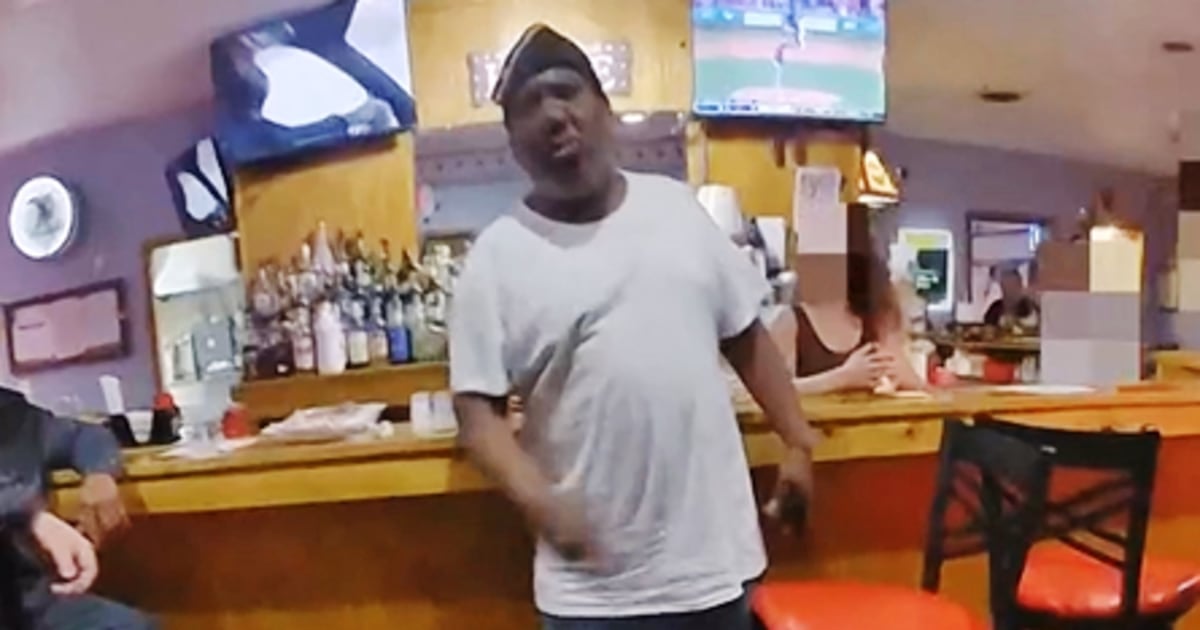In video of the April 18 encounter, Frank Tyson can be seen lying motionless on the floor of a bar for more than 5 minutes before police check him for a pulse.
The Canton Police Department in Ohio has released body camera video from the night a 53-year-old man died after he repeatedly told officers “I can’t breathe” as he was handcuffed with his hands behind his back and he was pinned to the ground.
In video of the encounter on April 18, the man, Frank Tyson, can be seen lying motionless on the floor of a bar for more than 5 minutes before police check him for a pulse and about 8 minutes before CPR is started.
In the nearly 36-minute video, police respond to the scene of a single-car crash to find a downed power pole and an unoccupied vehicle with the driver’s side door open and an airbag deployed.



It’s because they don’t see them as people, they see them as violent criminals that the world would be better off without.
If you step into their shoes for a minute, and one of the criminals you just successfully took off of the streets said they can’t breathe, your first thought might be “good. Maybe that’ll teach you a lesson about doing crimes in my neighborhood.” Your second might be “I wish I could shoot you right now and get this over with, but maybe I’ll get lucky and I can say I didn’t hear you.”
Note that the second one is inherently a stupid thought, there’s body cams. That kind of logic didn’t stop my 5-year-old from telling me she cleaned her room when I could easily check and find out she didn’t, and it won’t stop cops from fantasizing about everything working out here.
That’s exactly why they do things that way. They’re living out a fantasy world where there are no real rules and there are no consequences, and they have to live a balancing act between indulging in that and dealing with reality. Sometimes cops fail to balance that, and that’s what we see here.
As for who trains them, it’s their fellow cops. This isn’t a bunch of individual fantasies, these men work and train and talk together about how it’d be so much better if they had less restrictions and just talk about that hypothetical world. New cops who have any kind of racism or similar “My group is best” can join the conversation and add in their own unique version to the group fantasy. New cops who aren’t already racist, though, won’t hear blatant racism. No, they will just hear about crime stats and reoffending rates, about cops that died trying to deal with all the supposed crime, and about how stopping them is justice and will help everyone, not just cops. In time they’ll share the group fantasy, too, and stop seeing their victims as people. Occasionally someone just doesn’t join in the fantasy and they get bullied until they quit.
This is why the easiest way to move forward from this kind of thing is to gut the police departments and start over, or we at least need bodycams that can’t be turned off so easily.
Maybe, but it didn’t used to be this way even as recently as the 80s. And it isn’t like this in most other countries (at least the European ones km aware of).
It’s a cultural thing, and training, and it can be fixed, we just have to want to fix it bad enough. No idea what will be the tipping point. George Floyd wasn’t enough, so I’m not sure what if anything will be. Or if we’ll just go deeper I to this police state mentality where everything is an us vs them situation.
What talking about cops Always been this way. Especially in the 80’s and 90’s when we didn’t have recordings devices. Remember Rodney King?
Are you too young to remember the Rodney King protests? They literally had to call in the Marines and the Army to quell them. That was in 1991, and a result of police brutality against an unarmed Black man.
Edit: Wanted to add that police in general came from slave patrols. It was a racist institution designed to instill terror into people of color from the very beginning. It was never about “serving and protecting.”
deleted by creator
Yes, I was a baby in 1991. I don’t have data, but I’ve heard anecdotes from former police officers that police training has changed significantly since the 80s.
It’s definitely become much more militarized.
I don’t disagree with that, but it would be false to say that police brutality directed at people of color is a new thing. That’s always been there.
I never said police violence directed at people of color was a new thing.
My point, which I think wasn’t very clear bcz I worded it poorly is that police are trained to draw their guns immediately today and shoot to kill. That didn’t used to be the case.
That, I do agree with. It’s been militarized in the last 20-30 years for sure.
The militarization accelerated due to events where the police took an ass whoopin like the North Hollywood bank robbery.
Warrior training has taken like wildfire, they’re trained to do anything to survive and put into the mindset that if they don’t kill they will be killed.
Thanks to that shitbag Grossman they get all the violence with none of the rules of engagement
There just wasn’t high definition evidence from the time youre thinking of. Give this 20 years and I bet any video recordings of average police behavior will be “deepfakes”.
Nothing to see here citizen. Now pick up this can…
It’s always happened. There just used to not be cameras all around all the time.
Rodney King was the 90s George Floyd.
deleted by creator